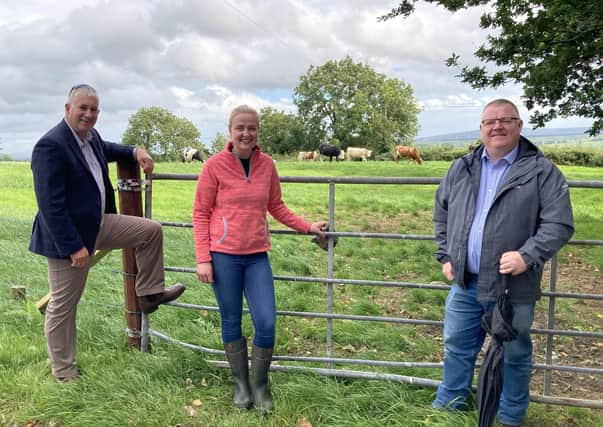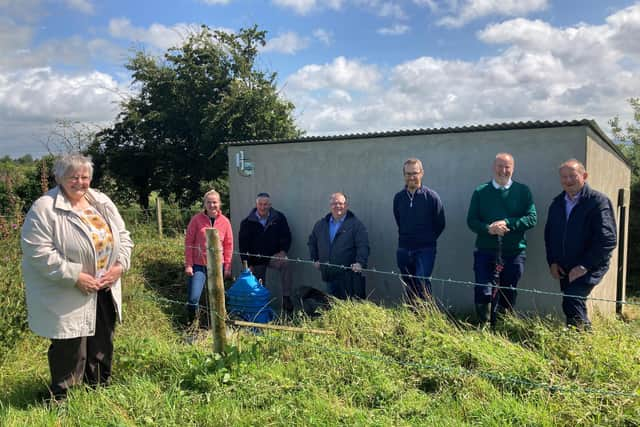Climate change tops the agenda


The visit was organised by the Ulster Farmers’ Union and was an important opportunity to inform the committee’s ongoing examination of climate change legislation and to hear how local farmers are embracing carbon friendly practices.
Speaking after the visit, Declan McAleer MLA said: “It was extremely interesting to see at first-hand how the Pollock family has incorporated hydroelectric, wind, solar energy and low emission techniques into their farm business.
Advertisement
Advertisement
“I also found it extremely interesting how the family has adopted new technologies on the farm and take a very scientific approach to grassland, business and livestock management.


“We also heard at first hand the challenges faced by the farming community, particularly in the west with fluctuating weather patterns, poor connectivity to the electricity grid and the imbalance in farm support measures with neighbouring farm businesses in Donegal.
“This was a fantastic learning opportunity where we heard directly from a young farmer at the cutting edge of the industry. We were very grateful to the UFU to the Pollock family for the hospitality we received on the farm visit.”
The Agriculture Committee chair has also highlighted what he believes to be the failure of the UK government to listen to the demands from farmers and agri-food producers and act on labour shortages caused by Brexit.
Advertisement
Advertisement
He said: “The Ulster Farmers Union have written to all MPs and to the British government calling on it to act on the labour shortage hitting the farming and agri-food industries as a result of Brexit.
“Our farmers, producers and manufacturers need certainty in order to be able to get on with their businesses. The British government needs to implement the protocol as it has already agreed to in order to provide that certainty.
“Even the British government’s own Department for Trade has recognised the special economic circumstances the protocol affords for businesses in the north.
“The demands from farmers and producers need to be listened to and the British government needs to act and implement the protocol.”
Advertisement
Advertisement
UFU president Victor Chestnutt said: “The meeting with MLA representatives gave us the opportunity to demonstrate in person, what our farmers are doing daily to reduce greenhouse gas emissions on their farm, working to combat climate change while continuing to produce high-quality food to world leading standards.
“Major talking points during the visit included low emissions slurry spreading equipment, renewable energy technologies, fertiliser efficiencies, feed to yield systems, carbon sequestration and animal health improvements.”
Guiding Mr Chestnutt and the group of MLAs around her home farm, Jessica explained how she began farming full-time and outlined how farmers are committed and willing to play their vital role in addressing climate change.
“Jessica highlighted the great work she, like many other farmers, are doing such as implementing renewable energy technologies including solar panels and a hydro-electric turbine. Jessica has implemented a breeding programme over the past five years to produce a crossbred animal that has the advantages of each breed and is increasing carbon sequestration through planting hedges and farmland trees. She discussed the ways in which she wants to develop their family farm business to benefit both the environment and consumers.
Advertisement
Advertisement
“As a young farmer, Jessica went on to highlight how her generation is the future of the farming industry in Northern Ireland and that they are already steering agriculture in a positive direction with an environmental focus at the forefront. She made it very clear that to ensure that the great work of farmers can continue, we need support from government and the right legislative framework to be able to deliver the balance of high-quality food production and low carbon farming. It’s vital to ensure that there is a future for sustainable family farms across Northern Ireland and to protect our local food security,” said the UFU president.
Meanwhile, Newry & Armagh DUP Assemblyman William Irwin MLA has said that future legislation around climate change in Northern Ireland must be mindful of major global polluters.
Mr Irwin was speaking as again climate change has been in the headlines with various adverse weather events such as flooding and wildfires affecting countries around the world.
Mr Irwin said:“The climate debate is certainly one that divides opinion, as we have witnessed even locally here in Northern Ireland with two climate change bills being brought forward with differing aims and objectives. However, even with this differing set of opinions, I feel it is of utmost importance to have a very firm focus on countries where, rather than curtailing industries which are known major polluters, are instead accelerating programs to increase their use such as coal-fired power stations as we see in China.”
Advertisement
Advertisement
He added:“Whilst we all have an obligation around reducing emissions, it makes little sense to put overly onerous restrictions on our own local industries in a bid to tackle our 0.04% contribution to global emissions, when we see a country such as China actually ramp up industrial emissions. China continues to build many more coal-fired power stations in a bid to meet their own internal demand and global economic aspirations. China is a country that is responsible for over one quarter of all global greenhouse gas emissions.”
He continued, “Whilst we all recognise the need to reduce emissions in a global context, I do feel some political parties in Northern Ireland are being unrealistic with people with their ever overreaching aims to curtail industries such as farming.
Indeed, many who argue for more stringent legislation may be driving vehicles built in countries with very poor records on emissions or in their everyday lives rely on goods and technology from these countries. There is a major contradiction at play and as a farmer I would rather see sustainable and sensible climate change policies brought to the fore rather than idealistic and in fact counterproductive legislation enacted that will only see domestic demand met from the very countries who are major contributors to climate change.”